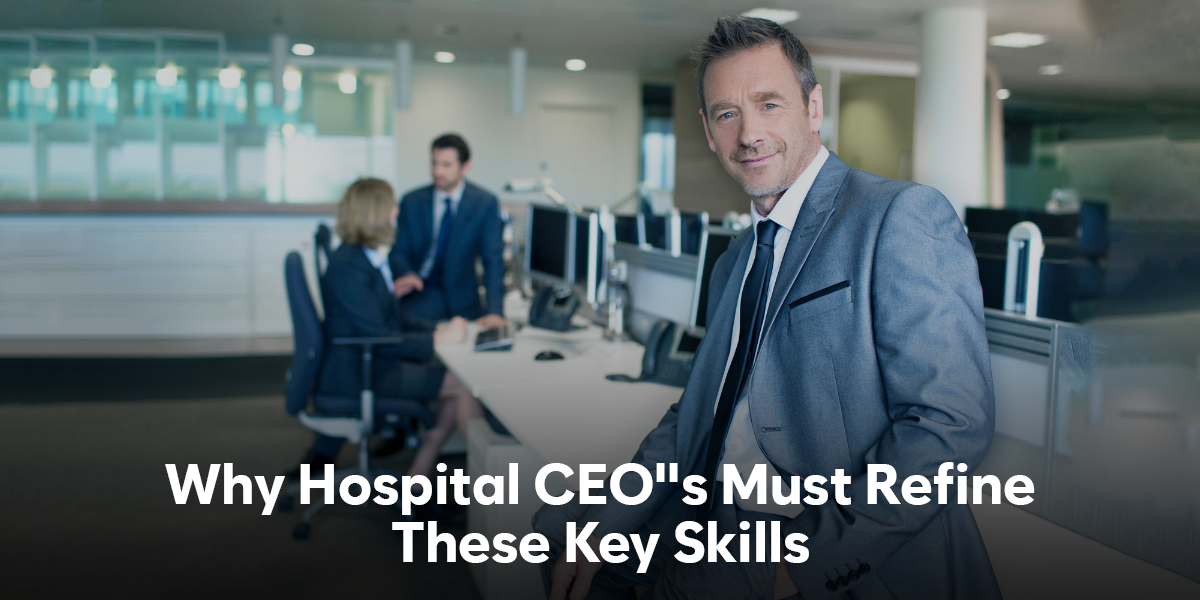Hospital CEOs find themselves navigating through a myriad of challenges, ranging from technological advancements to policy changes and the complexities of patient care. To effectively lead their institutions through these turbulent waters, CEOs must possess a diverse skill set honed to address the most pressing issues facing the healthcare industry today.
Here are some of the key skills that hospital CEOs must refine to successfully tackle these challenges.
Adaptability and Flexibility
Healthcare is an industry characterized by constant change. Hospital CEOs must possess the ability to adapt swiftly to new technologies, regulations, and market dynamics. Whether it is implementing electronic health records systems or responding to shifts in reimbursement models, CEOs need to lead their organizations with agility and foresight.
Strategic Vision
Effective leadership in healthcare requires a clear strategic vision. Hospital CEOs must be able to identify emerging trends and anticipate future challenges. By developing a robust strategic plan, CEOs can steer their institutions towards sustainable growth and success amidst uncertainty.
Financial Acumen
In an era of rising healthcare costs and shrinking reimbursements, financial acumen is essential for hospital CEOs. They must possess a deep understanding of healthcare economics, revenue cycle management, and cost containment strategies. By optimizing financial performance, CEOs can ensure the long-term viability of their organizations while delivering high-quality care to patients.
Effective Communication
Hospital CEOs serve as the face of their institutions, representing them to stakeholders both internal and external. Effective communication is one of the key skills crucial for building trust and fostering collaboration among staff, physicians, patients, and community partners. CEOs must be adept at conveying complex information in a clear and concise manner, whether addressing a board of directors or engaging with the media.
Collaborative Leadership
Healthcare is a team sport, and successful CEOs understand the importance of collaborative leadership. By empowering their management teams and fostering a culture of collaboration, CEOs can harness the collective expertise of their organization to drive innovation and achieve shared goals. Collaboration extends beyond the walls of the hospital, encompassing partnerships with other healthcare providers, payers, and community organizations.
Patient-Centered Focus
At the heart of healthcare delivery is the patient. Hospital CEOs must prioritize the patient experience and ensure that care delivery is patient-centered and culturally competent. By listening to patient feedback, investing in patient safety initiatives, and promoting a culture of empathy and compassion, CEOs can enhance the quality of care and outcomes for those they serve.
Innovation and Creativity
The healthcare landscape is ripe for innovation, and CEOs must embrace a mindset of continuous improvement and creativity. Whether it is implementing telemedicine solutions, adopting value-based care models, or exploring novel approaches to population health management, CEOs must be willing to challenge the status quo and drive innovation within their organizations.
Ethical Leadership
Healthcare is an inherently ethical domain, where decisions can have profound implications for patients’ lives. Hospital CEOs must demonstrate unwavering integrity and ethical leadership, adhering to the highest standards of professionalism and ethical conduct. By prioritizing ethical considerations in decision-making processes, CEOs can uphold the trust and confidence of patients, staff, and the broader community.
Resilience and Emotional Intelligence
Leading a healthcare organization can be emotionally taxing, especially in times of crisis or uncertainty. Hospital CEOs must cultivate resilience and emotional intelligence to navigate challenges with grace and composure. By practicing self-care, seeking support when needed, and demonstrating empathy towards others, CEOs can maintain their own well-being while effectively leading their organizations through turbulent times.
Risk Management and Crisis Preparedness
Healthcare is not immune to risks and crises, whether they be natural disasters, cybersecurity threats, or public health emergencies. Hospital CEOs must proactively identify potential risks and develop robust contingency plans to mitigate their impact. By fostering a culture of preparedness and resilience, CEOs can ensure that their organizations are equipped to weather any storm.
Conclusion
The role of a hospital CEO is multifaceted and demanding. It requires a diverse skill set to address the myriad challenges facing the healthcare industry. By refining key skills such as adaptability, strategic vision, financial acumen, effective communication, collaborative leadership, patient-centric focus, innovation, ethical leadership, resilience, and risk management, CEOs can effectively lead their organizations towards a brighter and more sustainable future, ultimately improving the health and well-being of the communities they serve.




